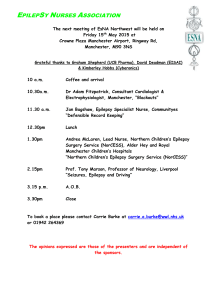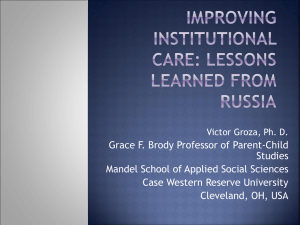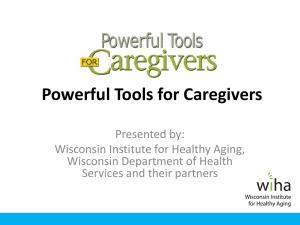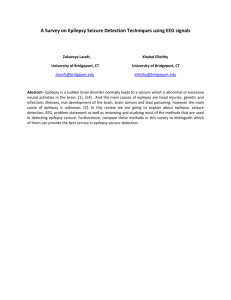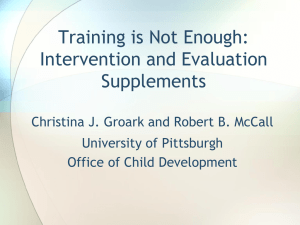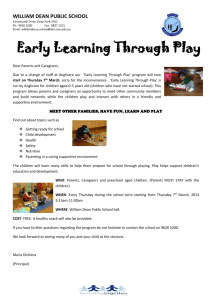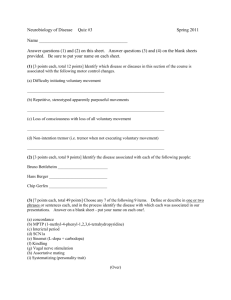262-789-1-RV - ASEAN Journal of Psychiatry
advertisement
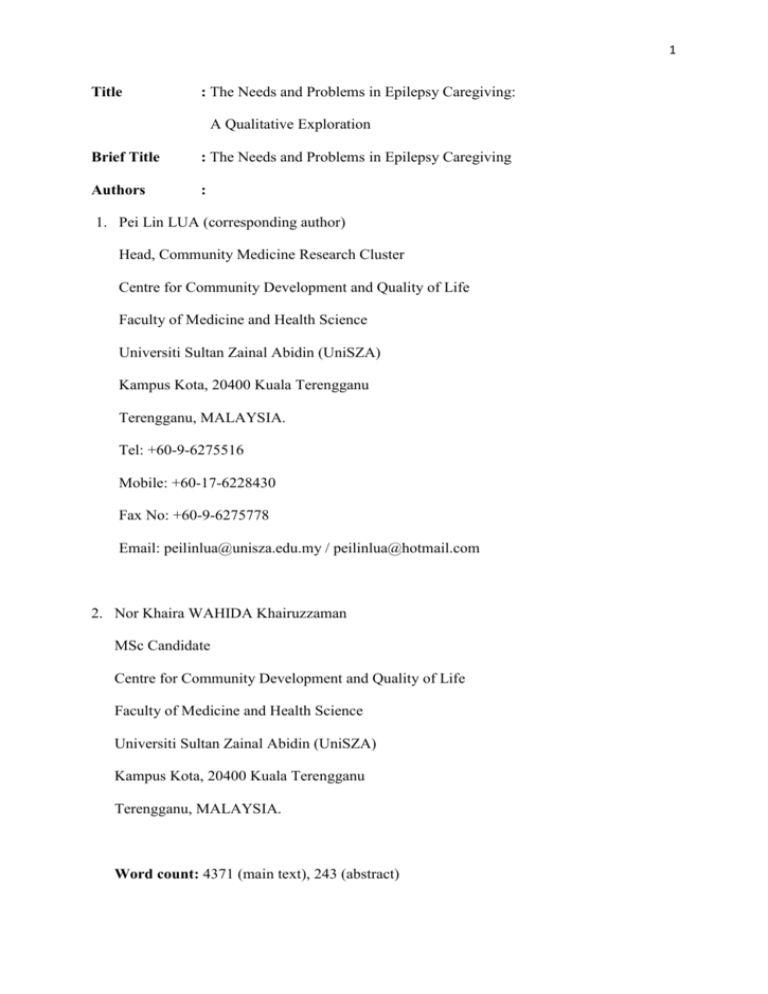
1 Title : The Needs and Problems in Epilepsy Caregiving: A Qualitative Exploration Brief Title : The Needs and Problems in Epilepsy Caregiving Authors : 1. Pei Lin LUA (corresponding author) Head, Community Medicine Research Cluster Centre for Community Development and Quality of Life Faculty of Medicine and Health Science Universiti Sultan Zainal Abidin (UniSZA) Kampus Kota, 20400 Kuala Terengganu Terengganu, MALAYSIA. Tel: +60-9-6275516 Mobile: +60-17-6228430 Fax No: +60-9-6275778 Email: peilinlua@unisza.edu.my / peilinlua@hotmail.com 2. Nor Khaira WAHIDA Khairuzzaman MSc Candidate Centre for Community Development and Quality of Life Faculty of Medicine and Health Science Universiti Sultan Zainal Abidin (UniSZA) Kampus Kota, 20400 Kuala Terengganu Terengganu, MALAYSIA. Word count: 4371 (main text), 243 (abstract) 2 THE NEEDS AND PROBLEMS IN EPILEPSY CAREGIVING: A QUALITATIVE EXPLORATION Abstract Living with epilepsy imposes great challenges on both patients and their family caregivers but most researchers only explored the impact on patients, with less attention given to family caregivers. Our study intended to explore the needs and problems of epilepsy family caregivers encountered during the caregiving process. Respondents were recruited from the Neurology Clinic of Hospital Sultanah Nur Zahirah (HSNZ), Kuala Terengganu. A semistructured interview was conducted using open-ended and broad questions asking about their general experience in caregiving, daily routine activities, caregiving effects, caregiving difficulties and caregivers’ needs. The interviewed data were later transcribed into verbatim before further analysis using the QSR International’s NVivo10 software. Fifteen Malay Muslim family caregivers between the age of 19 and 66 years participated. Most were females (53%), married (67%), with education level at secondary school or equivalent (73%) and were housewives (40%). In particular, respondents expressed the need for extra support from their family members and experts in terms of physical (care relief), mental and financial aspects. In addition, the major caregiving problems identified included: 1) emotional disturbances (sad, angry, depressed and anxious), 2) caregiving challenges (family adjustments, physical burden, psychological burden and time management) and 3) financial issues (not working and limited family income). Some advantages in caregiving were also reported. In conclusion, their experiences exposed the difficulties in caregiving, causing substantial emotional pressure which could later lead to poor quality of caregiving. Continuous support from experts and families in these issues is clearly vital. Keywords: Epilepsy, family caregivers, needs and problems 3 Introduction In Malaysia, epilepsy occurs in up to about 1% (three to nine per 1000 population), whereby it has been estimated that more than 200,000 Malaysians are diagnosed with this chronic disease 1, 2, 3 . With this number, even greater numbers of family caregivers could be affected with this illness since living with epilepsy is demanding for both patients and their caregivers 4. Although the epilepsy is directly diagnosed to an individual, the whole family’s daily routines could be changed at the time of epilepsy onset 5. At times, family caregivers have difficulties to fully admit and accept the fact that their loved ones are inflicted with the disease especially when the seizures tend to arise suddenly, giving its nature which is highly unpredictable. Moreover, the most difficult thing to further accept is the “epilepsy label” whereby the disease has always been associated with differentness, discreditable and spoiled identity 6, 7. Essentially, family caregivers too require support from specialists, nurses, rehabilitation experts and social workers to help them cope with the many adjustments and uncertainties which accompany the diagnosis of epilepsy. To continue with a normal life, appropriate resources should be provided, such as knowledge to enhance understanding and assist coping. In particular, they need to improve self-management skills in order to increase self-efficacy level for better compliance and coping technique in managing epilepsy patients 8. Additionally, many family caregivers of patients with chronic conditions including epilepsy are constantly concerned about the long term costs of treatment and care maintenance. They also worry about the insufficient health insurance or low income flow in the family 9. Epilepsy is rather similar to other chronic diseases in terms of economic burden. The overall 4 medical cost for patients could be divided into direct and indirect costs which ultimately contributed to the financial burden of family caregivers. Direct cost includes the resources consumed by family caregivers for patient diagnosis, treatment or rehabilitation whereas indirect cost refers to the loss of cost of unemployment, decreased productivity and household work due to inability of the affected patients to perform their jobs or work at home 10. Expectedly, this disease is known to further exert a significant impact on health-related quality of life (HRQoL) of people close to and caring for someone with epilepsy. Such impact could result in extra burden and decreased in family caregiver’s HRQoL 7. They could be overwhelmed by enormous worries and concern about the patients’ prognosis, unpredictable nature of epilepsy, the side effects of anti-convulsants and the impairment to brain functions 6. Accordingly, family caregivers are similarly at high risk for anxiety which could significantly correlate with patients’ HRQoL 11. Some studies have shown that family caregivers faced high level of strains, whereby they feared that the illness may cause injury or death as well as being concerned about what would happen to patients in future when they are not be available to cater for patients anymore. Besides, they are constantly anxious about the patients’ potential future career and marriage possibility 6. Researchers also have revealed that most family caregivers tended to experience emotional problems i.e. depression, anxiety, helplessness, embarrassment, guilt and resentment, causing loss of vitality in which later interfered with their work or other daily activities 12. 5 Epilepsy in children for example, often causes multiple stressors, adjustment related problems and disturbances in family relations 13, 14 . These difficulties placed tremendous pressure on family caregivers into handling caregiving as well as keeping their roles in domestic affairs intact, leading to increase burden and feelings of stigma. As a result, epilepsy indirectly inflicts enormous physical, psychological, social and economic burdens on families 15. On the other hand, parents also tend to overprotect the patients, which in turn would prevent the independent lifestyle in patients and their overall social development 16, 17. Caregivers’ undivided focus on patients could further result in poor relationships between the patients and siblings and psychological difficulties among siblings. Such preoccupation could also affect family cohesion and relations between family and their community 18 . When the patients are admitted to the hospital or go for treatment, each family member has to adjust their routine in some way, they may be apart, days of work may be missed, siblings may feel left out and everyone may be worried and tense 9. Aim of study This study aimed to explore the epilepsy family caregivers’ needs and problems encountered during the caregiving process. In particular, the family caregivers’ experiences including their feelings, values and meanings involved while looking after the patients were to be studied so that structured health education programmes could be tailored to meet these needs and minimise their misfortunes while maintaining well-being. 6 Methods Ethical and Institutional Approval A contact with the hospital authority was made in order to ensure they permitted the study to be conducted and understood its purposes. The explanation included the targeted respondents, study procedure, study duration and requirements needed from the respondents as well as hospital staff. Official ethical approval was obtained from the Ministry of Health Research and Ethics Committee Malaysia (MREC) with the reference number, KKM/NIHSEC/8002/2/2 Jld.3.P13-686. Subsequently, contacts were established with the respective clinic coordinators including the staff nurses and medical assistants to discuss the meeting day, date and time for data collection. The discussion included the list for suggested family caregivers along with the date and time to meet. Study Site Data collection for this study was conducted in Neurology Clinic at Hospital Sultanah Nur Zahirah (HSNZ), Kuala Terengganu, Malaysia. All participants were recruited during the weekly routine clinic day. Data Collection Technique A qualitative technique was adopted to gather the information desirable as this was considered the most appropriate method to generate in-depth knowledge about caregiving experiences 19. Explorative interviews with guiding questions were utilised to ensure that the needed data was investigated in a similar structured manner within each family caregiver. 7 Participants Fifteen consenting participants among epilepsy family caregivers were recruited into this study. The participants were selected based on the inclusion criteria as follows: 1) age 18 years old and above, 2) primary caregiver to the epilepsy patient and 3) can read, write, understand and communicate in Bahasa Melayu or English. Study Procedure Data collection was carried out between February to April 2014. The respondents were chosen through the Neurology Clinic patient database list. The list consisted of regular epilepsy patients who attend the treatment in these clinics along with their family caregivers. The caregivers needed for this study were those identified and recommended by the staff nurses to be interviewed by the research assistant two weeks before study commencement. On the meeting day, the caregivers were firstly invited into a designated interview room for privacy. They were provided with a thorough explanation on the study purposes and its procedure as written in the Family Caregiver Information Sheet. Written consent form was later signed upon participation agreement by the participants. A semi-structured interview was conducted to deliver the intended questions and pose additional probes to the caregivers. The interview questions were open-ended and broad in order to elicit detailed description of the participants’ experiences. The questions focused on family caregivers’ experiences in caregiving i.e. managing the patients at home, school and outdoor, daily routines, emotional well-being, social life, caregiving burden, difficulties in caregiving, caregiving needs and concerns. Their perspectives on the patients they taking care of in the terms of health performance and condition improvement were also focused. 8 Analysis Qualitative Data The data obtained was analysed using the QSR International’s NVivo10 software. The audiotaped interviews were initially transcribed into verbatim using Microsoft Word processing programme. The interviews were later reanalysed at least three times to confirm the completeness of the verbatim transcription. The transcripts then were verified and read through again at least three times to confirm the key themes and patterns which emerged from the data in relation to the research questions. Later, the data were scrutinized to detect saturation of ideas and recurrent patterns of similar meaning and expressions. All data was originally recorded in Bahasa Melayu, but the final scripts were translated into English. Quantitative Data The Family Caregivers Personal Information was used to collect participants’ sociodemographic data. The personal information obtained included age, gender, marital status, religious, employment status, educational level, monthly income and relationship to patient. The data were expressed as frequencies and percentages as appropriate. Results A total of 15 epilepsy family caregivers participated in this study. According to Table 1, eight were females (53%) while the rest were males. Most of them were married (67%) and their age ranged from 19 to 66 years old. The participants’ highest education level was reported to be at secondary level (73%). In the majority, their relationship with patients was as either mother or father (40%). In terms of employment, many were housewives (40%). 9 Table 1: Sociodemographic characteristics of epilepsy family caregivers (n=15) Variable No. of respondents Percentages Female 8 53.3% Male 7 46.7% 18 – 27 3 20.0% 28 – 37 1 6.7% 38 – 47 3 20.0% 48 – 57 3 20.0% 58 – 67 5 33.3% Single 3 20.0% Married 10 66.7% Divorce/widow 2 13.3% Degree 1 6.7% Diploma 1 6.7% Secondary school 8 73.3% Primary school 5 20.0% Public servant 3 20.0% Self-employed 4 26.7% Housewife 6 40.0% Unemployed 1 6.7% Sex Age (years) Marital status Level of education Occupation 10 Others 1 6.7% Mother 4 40.0% Father 4 40.0% Husband 3 20.0% Wife 2 13.3% Daughter 1 6.7% Son 1 6.7% Relationship to patients Data from the completed analysis were largely grouped into needs, problems and advantages, whereby the theme for needs included: support for caregivers, whereas problems were divided into these themes: 1) emotional disturbances, 2) caregiving challenges and 3) financial issues. They were further broken down into smaller, more focused subthemes. The last group of findings unexpectedly emerged to be the “advantages” of caregiving. Theme 1: Support for caregivers With regard to the need for additional support in caregiving, a few participants (n=4) expressed their requirement for care relief from other family members and experts. Family caregivers usually neglected their own welfare during caregiving because most of the time they were too concerned about the patients’ health well-being. i) Care relief The most important support they need was to take a short break from the caregiving duty. They mainly mentioned the quality time they longed for themselves and that they could not attain their personal needs as they feel guilty towards the ill patient. 11 I really need time for myself. I never had a chance to entertain myself ever since my son has been diagnosed with epilepsy. (Informant no. 4) I do hope that my other sons understand more about their sick elder sister. I feel very tired of handling the situation. I really need a break from all of this. (Informant no. 7) I wish someone could help me in taking care of my husband. It is tough to handle it alone. Sometimes I need space for myself. (Informant no. 8) Sometimes I really want to hear the doctors say that they could take care of my wife so that I can focus more on my job. (Informant no. 13) ii) Motivation Most of the family caregivers conceded that they need extra motivational drive to encourage their moral spirit in caregiving. The data gathered demonstrated their lack of self-esteem in socialising. There are times when I have to be really strong but then I just do not have the courage to look after her even though I know that she is incapable of looking after herself. These are the times when I need someone to cheer me up. (Informant no. 5) 12 iii) Financial support Another common needs reported by the family caregivers was financial aid. A number of the participants (n=3) fell into the poorest group of the society. The monetary needs were cited as they were unable to work due to imminent responsibilities in caregiving. Do you know where can I apply a fund for my son? I really need money to survive. I really need the help to raise our family income. My husband is suffering from stroke therefore he could not make a job. There is no chance for my son to do a job. I am just a rubber tapper and you know how little the money I earn with that job. (Informant no. 11) Theme 2: Emotional disturbances A major finding in this study was the range of emotions experienced by the family caregivers. They were overwhelmed with emotions which enhanced mainly negative elements of feelings in their lives. This would likely pose difficulties for them in caregiving routine, thus adding potential stress to both caregivers and patients. i) Sadness and depression In some cases, family caregivers expressed their sadness of having a sick children or spouse. Obviously they were unable to live a normal life due to the nature of the disease itself, thus it saddened them for having to accept the fate. These sorrows would literally lead to depression (if left unchecked) among the family members in whom their daily routines have changed dramatically. 13 I couldn’t stop crying the moment I knew my kids have this disease. Three of them, and I knew I couldn’t do anything else. I was so depressed at the beginning. I still feel sad even till now. I just couldn’t… (Informant no. 6) ii) Anxiety and fear In addition, this study also uncovered feelings of anxiety and fear among the family caregivers. The anxiety rose as they learnt the prognosis of the disease while the unpredictable nature of epilepsy led to substantial fear in handling the illness. It was when he was about 15 years old when my son started suffering from epilepsy. It was difficult for us to handle. This illness really scares you because you don’t know when he will have the seizures. (Informant no. 3) I feel very anxious everyday as my daughter go to school. We are thinking of stopping her from going to school because we are so worried that something might happen to her while she was away from us. (Informant no.5) I’ll never allow my mom to live alone in the house. We also do not allow her to drive or ride the motorcycle because we fear something might happen if we let her do it. (Informant no. 15) 14 Theme 3: Caregiving challenges Family caregivers could expect to experience a disruption or crisis while taking care of their loved ones. Many challenges could emerge during the caregiving especially when the illness could not be predicted or controlled. Most of the family caregivers have to bear with the difficulties in managing daily problems which arose during caregiving. i) Family routine adjustments There were times when the commitment to look after the patients affected the family bond such that most routines needing adjustment in order to avoid the difficulties in caregiving. Family caregivers have to particularly sacrifice their time and energy as an effort to prevent stressful problems among other family members. They too have to support each other, which was important for other members to fully understand the situation. There was one time where my boy feels angry towards me because I care more on his sick brother rather than him. He accused me of not paying attention to him anymore. (Informant no. 4) My relatives are still avoiding our family ever since they knew that my daughter have epilepsy. They couldn’t accept my daughter’s condition and they told me that our family have a curse. (Informant no. 8) I couldn’t continue my study yet because I have to wait for my brother to finish his study first because there is no one else to look after my mother. (Informant no. 15) 15 ii) Physical and psychological burden Some participants mentioned that they felt burdened mentally and physically from the caregiving process especially among the women caregivers. Exhaustion in caring with regard to energy and spirits were evident. At night, I couldn’t sleep because I am too tired of taking care of my husband. Sometimes I feel very weak until I tell myself that I couldn’t do this anymore. My husband always being admitted to the hospital and he’ll stay warded up to a month long. I feel very tired and exhausted. My mind is very complicated now. I don’t know what I should do… (Informant no.9) iii) Time management Despite being a caregiver for a certain period of time, some were still experiencing difficulties in dividing their time for personal, household and patients’ needs. The inability to manage the right proportion of time for different things in their lives was apparent. Every day I need to rush everywhere like sending my kids to school, looking after my mother, keeping on track with my epilepsy daughter and staying with my job. I already lost contact with my husband. Sometimes I feel miserable because I don’t have a spare time. Sometimes I don’t even know how to keep my time together to work with my bigger responsibilities. (Informant no.13) 16 Theme 4: Financial burden The results of the study detected two major reasons for financial issues among the family caregivers which were either due to unemployment of the caregivers or the small amount of income they were earning. i) No job Majority of the family caregivers were housewives, hence explaining the absence of employment. Because most were either mothers, wives or fathers, they were unable to work due to the need to watch for their loved ones. The rest of the family members might be working far away from home or they might have some other difficulties. I spent most of my money to get treatments for my son and husband. There is not enough money to spend for other things. Our house is very far from the town and hospital. It is difficult for me to get a job because no one else to look after my family. (Informant no. 7) ii) Limited family income The family income was strained simply because the caregivers were among the poorest group of the society. The pressure of merely being fishermen, rubber tappers or gardeners further compounded the already huge with a lot of household responsibilities. Financial burden also came from transportation cost, home care and school fees. My family is very poor and we just have a motorcycle to go everywhere. I feel restless and depressed because our family income is very small. I am an old lady, somehow my 17 energy does not feel like before and I only live with my only daughter, who has epilepsy. She couldn’t do any work or else her health condition become worse. (Informant no. 10) Theme 5: Advantages in caregiving Within this study, several positives indicators could be seen through the carers’ experiences. The caregiving process had apparently increased their strength and energy in looking after the family as well as the patient. This especially was reported by the women caregivers. These caregivers were also eager to keep maintaining their health in order to continue the task each day. Furthermore, some family caregivers also expressed their satisfaction in caregiving through the help of other family members. A few of the informants mentioned too that their spiritual level had increased since the loved ones were diagnosed with epilepsy, making them feel more enthusiastic to manage the new daily routine at home. This was a test from the God. We have accepted our daughter’s fate. I will always be by her side. Our job was to make sure she forget her illness and make her happy always. (Informant no.2) I hope my wife can rely on me at all times. I will do whatever it takes to improve her condition. (Informant no.1) I did not regret my decision to postpone my study because my mother is more important to me. I will wait for my brother to take turns with me in taking care of her. I am happy that the responsibility is on me now. (Informant no.15) 18 Discussion Family caregivers generally play critical roles in transitions from hospital to home. They not only provide the majority of personal assistance to the patients, but also the health-related care. In fact, family caregivers are usually the persons who will actually implement care plans at home 20, who were also knowledgeable on the strengths and weaknesses of patients, which were very important predominantly in managing the behavioural problems and warning signs of the patients. It is known that epilepsy imposes a significant impact on patients and family caregivers but this could be worse on caregivers due to the lack of attention given to them. Some studies reported that the caregivers seemed to have burden of care which probably reflects their natural reaction to the situation they confronted with, in this context, the caregiving course. Epilepsy patients and their families could have fears when the diagnosis is made whereby the onset of epilepsy may have frightened the families and the frequent occurrence of seizures reinforces the belief that the illness is life-threatening 21. In terms of needs, family caregivers have voiced their own desires to be fulfilled, in terms of needing to feel acknowledged, valued and understood by others. Without proper care for the caregivers, their own health and well-being could also be at risk which could in turn, jeopardise their ability to continue providing care to the patients. Family members, partners and close friends could all potentially provide the vast majority of the support for caregivers and patients in terms of care needs and functional limitations 22. 19 One critical problem found in this study was the emotional distress experienced by the family caregivers. The range of emotions reported varied from sadness, depression, anxiety to fear. These emotional experiences corresponded with the unpredictable nature of seizures which could have contributed to the sense of helplessness and lack of control during the attack 23. It was known that the family’s main concerns were fear of the seizure and injuries subsequent to that. In addition, some frustration may have also led to depression and anxiety 24. Evidence of greater impact on emotional aspects was found among caregivers who were constantly worried about the patients almost for 24 hours a day, resulting in negative feelings such as sadness, fear, nervousness and tension, all of which could interfere with their physical and emotional well-being 12. Our further investigation on the carers’ experiences also uncovered specific daily challenges within the routine. For example, a number of participants encountered with family adjustment difficulties were revealed. It was clearly hard to adjust such to situation within the family members at the beginning due to reactions towards the diagnosis. Managing epilepsy patients placed additional pressure on the family system 25 , leading to possible conflicts among siblings, spouses or parents involving expressions of anger or aggression towards the caregivers for the less attention they received and the time they need to juggle for families and patients. Moreover, lack of consideration and care from other family members were also factors in family adjustment problems. Other reported problems encountered included physical and psychological burdens. A small number of participants reported difficulties to cope with this burden as they had reached the limits to deal with the patients alone. In particular, the carers had described physical strains such as sleep deprivation, fatigue from dealing with difficult behaviour of the patients or 20 unable to physically cope with lifting and worries about falling down in bathroom 26 . The psychological distress among caregivers was indicated by stress, over-arousal or even mental exhaustion from the length of time the care they had provided 25, 26. Moreover, epilepsy can be different for each person, so the need for care can vary greatly. More or less people with epilepsy do not need any additional care from others to live independent lives while other epilepsy patients may need a lot of care, some or all of the time, whereas some patients need care only when they have had a seizure. Hence, while many family caregivers in charge of the patients’ well-being would consider the duty to be completely normal, others might feel burdened for they had to juggle between patients’ safety and needs 27. Additional challenges were directed to managing the time in daily routine either involving household, work or caregiving responsibilities. The caregivers also claimed that in addition to multiple responsibilities at home, sometimes they might have to manage various health conditions from other family members too. In spite of the lack of a support system, most carers continue to patiently shoulder the entire household burden including cleaning, preparing meals, driving, coordinating medications and other related routines. Thus, the incapability to manage the overall task could lead to failure in balancing each routine, whereby unsurprisingly several studies reported that the carers experienced significant fatigue, sleep impairment and difficulty in maintaining self-focus and energy throughout the caregiving process 28. Expectedly, the findings also suggested the existence of some financial pressures among participants. The acquired additional financial issues could lead to negative impacts in the family’s overall budget. Epilepsy imposes an economic burden, mainly involving frequent hospital visits or using high doses of anticonvulsant drugs and hence increases cost 29 . This 21 burden emerged as a result of less productivity in the family, e.g. 1) the disorder commonly affects young people, often leading to avoidable unemployment, 2) the family caregivers could not work due to the full-time care duty or 3) none of the other family members was able to work (other illness, not at the age of working, or no transportation). Despite knowing the cost of epilepsy could increase the caregivers’ pressure on family expenses, they would always bear with the burden in seeking potential prevention and treatment for the patients 10. Many people in a caring role find it rewarding, and many would not want their situation to change. However, for some people, being a carer could be exhausting. Emotions such as guilt, resentment, anger, anxiety or helplessness can be common. Some carers give up their income and career prospects to care for someone. Sometimes, even if the family caregivers care very deeply for the person, it could feel as though the focus was always on them and that their needs and wishes go unnoticed. Carers often deal with their situation alone and could feel very isolated, whereby they always tend to abandon their own needs and well-being along the process 30. Therefore, it could be very vital for family caregivers to care and occupy some of the time for themselves once in a while. Hence, it was important to explore their experiences since the family caregivers spend a substantial amount of time interacting with their care recipients, while providing care in a wide range of activities 31. 22 Conclusion This study managed to identify five main caregiving concerns among the epilepsy family caregivers. These issues were identified as support for the caregivers, emotional disturbances, caregiving challenges, financial issues and even positive aspects gained from caregiving. The most frequently-encountered problem was emotional disturbances as most were overwhelmed by mixed feelings towards their loved ones. Thus, continuous support from other family members and experts should be provided in order to keep them fit to cope with the caregiving problems. A variety of information on caregiving techniques and disease facts could also be allocated to facilitate the existing misfortunes. Conflict of interest No competing financial interest exists. Acknowledgements The authors would like to express their sincere gratitude to Ms Noor Salihah Zakaria, Ms Neni Widiasmoro Selamat and Ms Norhayati Mustapha for their support and guidance. 23 References 1. Health Grades Inc. Statistics by Country for Epilepsy; 2011. Available from: http://www. rightdiagnosis.com/e/epilepsy/stats-country.htm. 2. Kurtzke JF, Kurland LT. The epidemiology of neurologic disease. In Yoynt RJ, ed: Clinical Neurology. 1993; (4). Philadelphia: Lippincott. 3. Zakaria AK. Principles of treatment of epilepsy. Malaysian J Med Sciences. 1998; 5 (1): 11-17. 4. Wheless JW. Intractable epilepsy: A survey of patients and caregivers. Epilepsy & Behavior. 2006; 8: 756-764. 5. England MJ, Liverman CT, Schultz AM, Strawbridge LM. Epilepsy across the spectrum: Promoting health and understanding; 2012. 6. Hung ATF. Psycho-social impact of epilepsy and issues of stigma. Medical Bulletin. 2009; 14 (5). 7. Van Andel J, Westerhuis W. Coping style and health-related quality of life in caregivers of epilepsy patients. J Neurol. 2011; 258: 1788-1794. DOI 10.1007/s00415-011-6013-1. 8. Buszewicz M, Rait G, Griffin M, Nazareth I, Patel A, Atkinson A, et al. Self-management of arthritis in primary care: Randomised controlled trial. 9. Landreth-Harris L. Family strategies for understanding and coping with the impact of epilepsy. Epilepsy: Insights and Strategies; 2010. 10. Begley CE, Beghi E. The economic cost of epilepsy: A review of the literature. Epilepsia. 2002; 43 (4): 3-9. 11. Jude UO, Abdel WA, Ali AF. Quality of life in people with epilepsy and their family caregivers: An Arab experience using the short version of WHO quality of life instrument. Saudi Med J. 2009; 30 (10). 24 12. Westphal-Guitti AC, Alonso NB, Migliorini RC, Indelicato da ST, Azevado AM, Caboclo LO, et al. Quality of life and burden in caregivers of patients with epilepsy. Journal of Neuroscience Nursing. 2007; 39(6). 13. Ellis N, Upton D, Thompson P. Epilepsy and the family: A review of current literature. Seizure. 2000; 9: 22-30. 14. Saburi G. Stressors of caregivers of school-age children with epilepsy and use of community resources. J Neurosci Nurs. 2011; 43(3): 1-12. doi: 10.1097/JNN.0b013e31821456f6. 15. Narendra KS, Bhattacharjee D, Nishant G, Sanjay KM, Nizamie SH. Perceived burden and social support of caregivers in early onset psychosis & epilepsy: A comparative study. Malaysian Journal of Psychiatry. 2011; 20 (2). 16. Engel J Jr. Epilepsy in the world today: Medical point of view. Epilepsia. 2002; 43 (6): 12-13. 17. Moffat C, Dorris L, Connor L, Espie CA. The impact of childhood epilepsy on quality of life: A qualitative investigation using focus group methods to obtain children’s perspectives on living with epilepsy. Epilepsy & Behaviour. 2009; 14: 179-189. doi:10.1016/j.yebeh.2008.09.025. 18. Devinsky O. Epilepsy: Patient and family guide by Orrin Devinsky. Paperback, revised; 2001. 19. Dicicco-Bloom B, Crabtree BF. The qualitative research interview. Medical Education. 2006; 40: 314-321. doi:10.1111/j.1365-2929.2006.02418.x. 20. Hills MD. The psychological and social impact of epilepsy. Neurology Asia. 2007; 12 (1): 10-12. 21. Besag F MC. Epilepsy, learning and behaviour in childhood. Epilepsia. 2005; 36 (1): 5863). doi: 10.1111/j.1528-1157.1995.tb01654.x 25 22. Feinberg L, Houser A. Assessing family caregiver needs: Policy and practice considerations. AARP Public Policy Institute. 2012; fact sheet 258. www.aarp.org/ppi. 23. Macleod JS, Austin JK. Stigma in the lives of adolescents with epilepsy: A review of the literature. Epilepsy & Behaviour. 2003; 4 (2): 112-117. 24. Myers K, Winters NC. Ten-year review of rating scales. II: Scales for internalizing disorders. J Am Acad Child Adolesc Pscychiatry. 2002; 41 (6): 634-659. 25. McCusker CG, Kennedy PJ, Anderson J, Hicks EM, Hanrahan D. Adjustment in children with intractable epilepsy: importance of seizure duration and family factors. Development Medicine & Child Neurology. 2002; 44: 681-687. 26. Lee RLT. Caring for family members with stroke: Chinese family caregivers’ experiences. AJNS. 2004; 7 (1). 27. Müller M, Jaggi S, Spirig R, Mahrer-Imhof R. Being a family member of a patient with epilepsy: A qualitative study of experiences with the loved one’s illness. Pflege, die wissenschaftliche Zeitschrift, in press. 28. Bevans MF, Sternberg EM. Caregiving burden, stress, and health effects among family caregivers of adult cancer patients. JAMA. 2012; 307 (4): 398-403. doi:10.1001/jama.2012.29. 29. Nuhu FT, Yusuf AJ, Akinbiyi A, Fawole JO, Babalola OJ, Sulaiman ZT Ayilara OO. The burden experienced by family caregivers of patients with epilepsy attending the government psychiatric hospital, Kaduna, Nigeria. Pan African Medical Journal. 2010; 5:16. 30. Epilepsy Society. 2013; factsheet 4. Available from: www.epilepsysociety.org.uk 31. Reinhard SC, Given B, Petlick NH, Bernis A. Supporting family caregivers in providing care. Patient safety and Quality: An Evidence-Based Handbook for Nurses; 2008.

